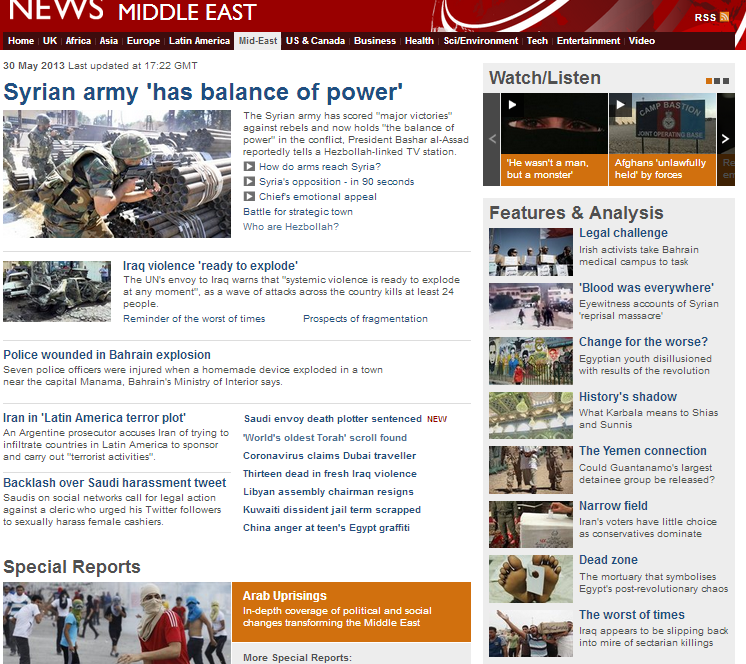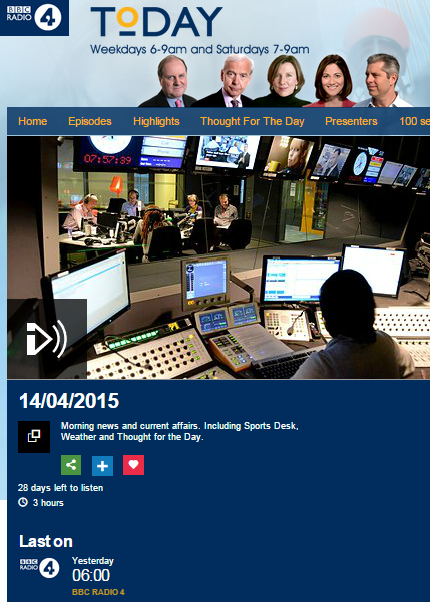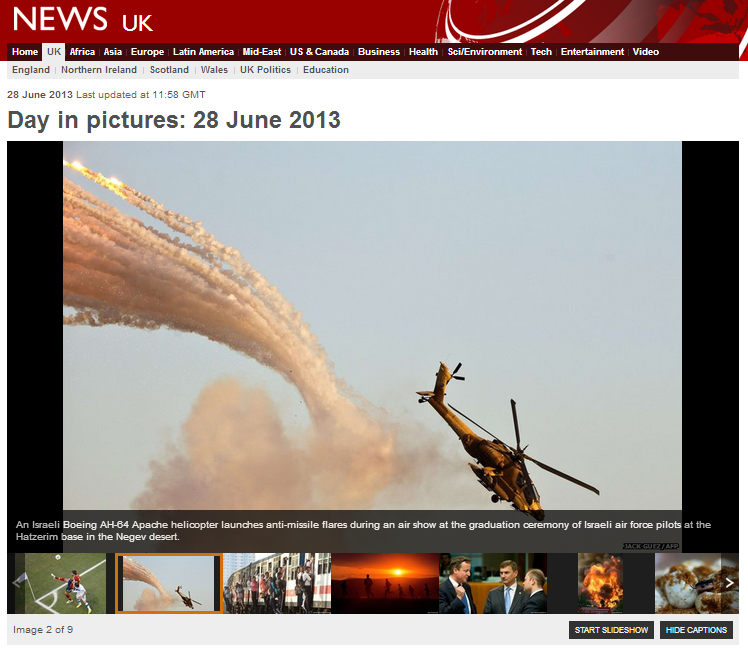The BBC Academy’s style guide includes instruction for the corporation’s producers and journalists on the correct terminology to be used when reporting on Temple Mount in the Old City of Jerusalem.
“Temple Mount – both words capped. Note that the area in Jerusalem that translates from Hebrew as the Temple Mount should also be described, though not necessarily in the first four pars, as known to Muslims as the Haram al-Sharif (ie lower case ‘al’, followed by a hyphen – and never ‘the al-Haram al-Sharif’, which is tautological). The Arabic translates as the Noble Sanctuary.” [emphasis in the original]
That guideline was generally followed in the past, as can be seen in the examples below.
“Ariel Sharon, then the leader of Israel’s opposition, paid a visit to the site in East Jerusalem known to Muslims as Haram al-Sharif, and to Jews as Temple Mount, which houses the al-Aqsa mosque – and frustration boiled over into violence.” (29/09/2004)
“The Temple Mount or Haram al-Sharif is the most important religious site in Jerusalem.” (circa 2007)
“The Temple Mount compound, in the old city in East Jerusalem, covers an area of 35 acres. […] The same area is known to Muslims as the Haram al-Sharif (the Noble Sanctuary).” (undated – circa 2009)
“The compound where the mosque lies is revered by Muslims and Jews and is a frequent flashpoint for violence. It is known to Muslims as Haram al-Sharif or the Noble Sanctuary, and to Jews as the Temple Mount.” (08/05/2013)
“Police said about 20 youths threw stones and fireworks at officers from the site, known to Jews as the Temple Mount and Muslims as Haram al-Sharif. […] The Temple Mount/Haram al-Sharif (Noble Sanctuary) compound, in the Old City in East Jerusalem, covers an area of 35 acres (14 hectares).” (25/02/2014)
“The compound – known to Jews as the Temple Mount and to Muslims as Haram al-Sharif – is the holiest site in Judaism, and contains the al-Aqsa Mosque – the third holiest site in Islam.” (30/10/2014)
In late 2014, audiences began to see the employment of different terminology by some BBC journalists, as highlighted below.
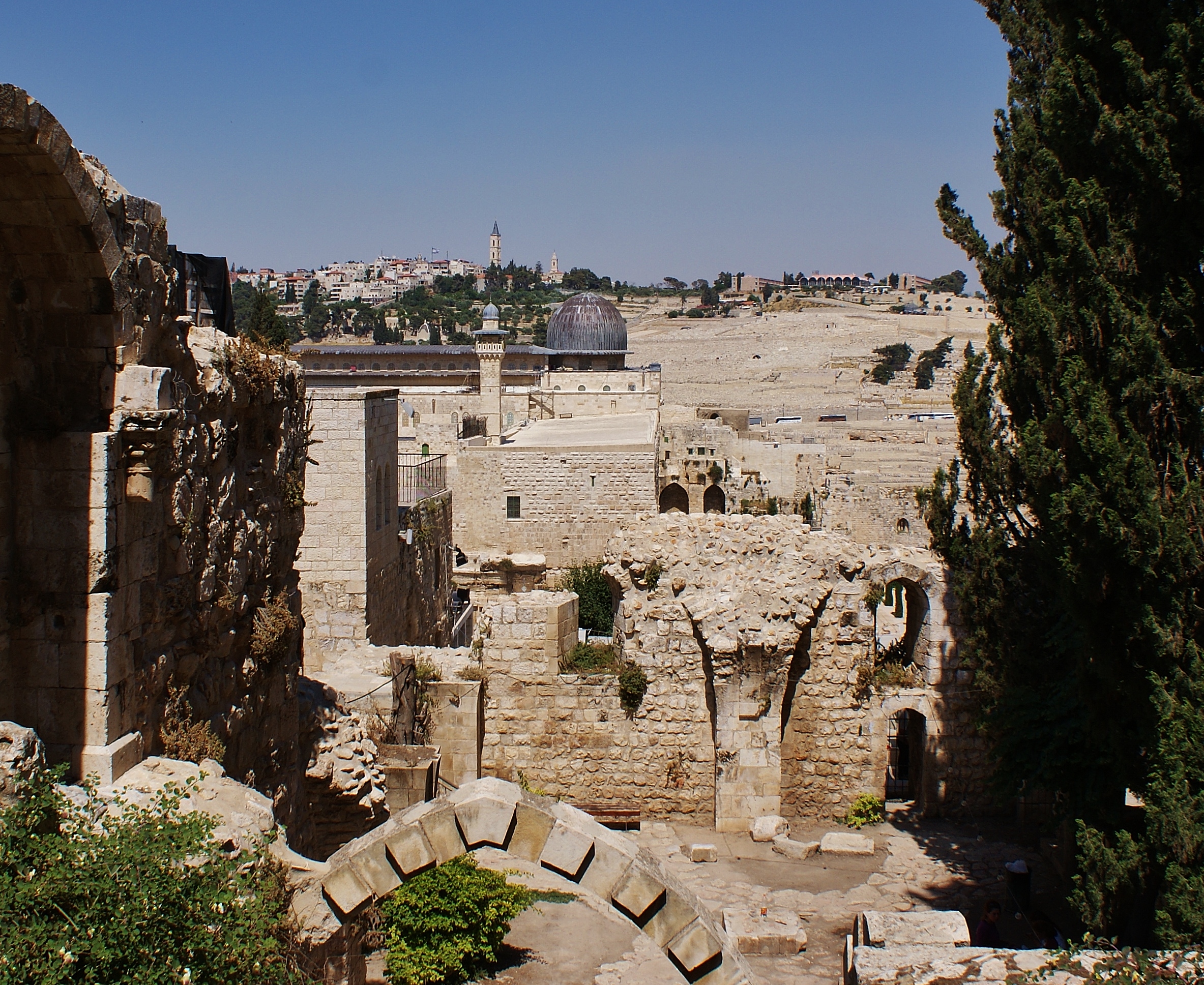
“Well…err….there were clashes between Palestinian protestors and Israeli police at the Al Aqsa Mosque compound – the place also known to Jews as the Temple Mount – in Jerusalem.” (05/11/2014)
Earlier, Israeli police clashed with stone-throwing Palestinians inside Jerusalem’s Al Aqsa Mosque compound, known to Jews as Temple Mount. […] And then all of these issues around restricted access to the Al Aqsa Mosque compound…ah…this holy site for Muslims, of course, but also for Jews who call it Temple Mount. (05/11/2014)
“It’s the Al Aqsa Mosque compound for Muslims – the third most sacred place in Islam – this mosque and then this is a site also revered by Jews because it contains…this is where the two Jewish temples were that stood in biblical times and at the moment Jews can’t pray there…ahm…but they can visit.”” (07/11/2014)
Concurrently, the BBC Academy recommended terminology was still seen in some reports from around the same time.
“But Israel also captured Haram al Sharif, or Temple Mount.” (08/11/2014)
“The Jerusalem compound that has been the focus of much of the unrest – known to Jews as the Temple Mount and to Muslims as al-Haram al-Sharif – is the holiest site in Judaism, while the al-Aqsa Mosque within the compound is the third holiest site in Islam.” (18/11/2014)
“Tensions in Jerusalem have recently been heightened by a dispute over a compound known to Jews as the Temple Mount – the holiest site in Judaism. The compound is known to Muslims as al-Haram al-Sharif and contains the al-Aqsa Mosque, the third-holiest site in Islam.” (19/11/2014)
“It is a compound which contains both the Al Aqsa Mosque and the Dome of the Rock, known to Muslims as Haram al Sharif: the place where the prophet Mohammed is believed to have ascended into heaven. It’s also the spot on which the ancient temples of the Jews stood: those buildings destroyed by foreign invaders which contained the Holy of Holies and which are the cornerstone of the Jewish faith and identity. To Jews it is the Temple Mount.” (18/11/2014)
“If you’re a Muslim you will know it as al Haram al Sharif. If you’re Jewish you’ll call it Temple Mount. Home to the Al Aqsa Mosque and the Dome of the Rock, this holy site in the Old City of Jerusalem is the focus of rising tensions between the two communities…” (28/11/2014)
However, the term ‘al Aqsa Mosque compound’ – or even just ‘al Aqsa Mosque’ – was employed to describe what the BBC previously called Haram al Sharif with increasing frequency from November 2014 onwards. [emphasis added]
“In the last few weeks what we’ve had is this big flare-up in tensions over the Al Aqsa Mosque compound; about access to this important religious site. It’s the third holiest site in Islam. For Jews, who call it Temple Mount, it is the holiest site in their religion.” (18/11/2014)
“But the key to all of this, we think, is this ancient dispute about rights of worship at the Al Aqsa Mosque – which is called Temple Mount by Jews of course. Now that is a site sacred to both faiths – to Muslims and to Jews.” (18/11/2014)
“Palestinian youths have clashed with Israeli police who entered the al-Aqsa mosque complex in East Jerusalem.” (26/07/2015)
“Palestinian youths have clashed with Israeli police at the Al Aqsa complex in East Jerusalem – one of Islam’s holiest sites.” (26/07/2015)
“The violence broke out at the Al Aqsa Mosque compound in the Old City – the scene of many confrontations in the past between Israelis and Palestinians, Jews and Muslims. And that’s because this large complex is home to sites revered by both religions.”
“The clashes erupted this morning following the morning prayers in what Palestinian Muslims call Al Aqsa Mosque, which is their holiest place in the city and what Jews believe it to be the Temple Mount.” (13/09/2015)
“Separately, violence has again rocked the al-Aqsa mosque compound.” (16/09/2015)
“And as you said this is really to do with the clashes that have taken place over the Jewish New Year’s holiday at the holy site you can see behind me: the Al Aqsa Mosque compound.” (16/09/2015)
“Clashes have broken out between Palestinian youths and Israeli forces at the al-Aqsa mosque compound in East Jerusalem.” (27/09/2015)
“Tensions have been particularly high in recent weeks over the long-running issue of access to the al-Aqsa mosque compound in East Jerusalem.” (01/10/2015)
“This week it’s the Jewish religious festival of Sukkot; that’s one of the times of year when Jews traditionally make a pilgrimage to Jerusalem. That means, of course, that they move towards the Western Wall in the old city; that means they’re close to the Al-Aqsa Mosque compound.” (01/10/2015)
“It’s home to the Al Aqsa Mosque; sacred to Muslims and Jews.” (09/10/2015 – the BBC Trust ESC decision relating to that statement can be found here.)
“The last straw has been the widespread belief that Israel is planning to allow Jews more access to the compound of the Aqsa Mosque in Jerusalem, which Palestinians call the Noble Sanctuary and Israelis call the Temple Mount.”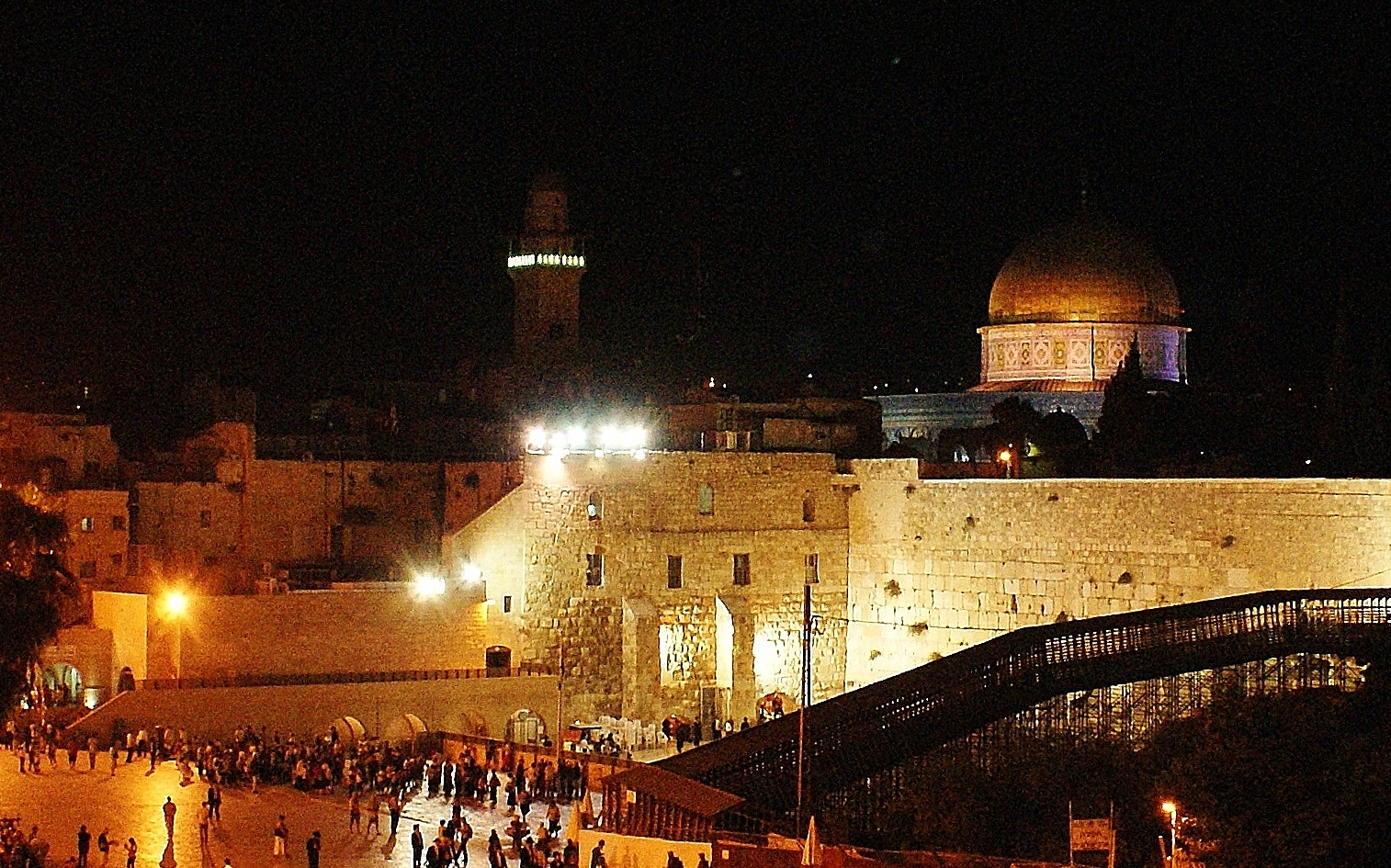
“Jerusalem: city of beauty, sanctity and hate. Its holy places are at the centre of the conflict. Only Muslims can pray in the compound around the golden Dome of the Rock at the Aqsa Mosque.” (15/10/2015)
“The current escalation was partly triggered by Palestinian fury over restricted access to the Al Aqsa Mosque compound in Jerusalem’s Old City. The site is holy to Muslims and Jews, who call it Temple Mount.”
“The Al Aqsa Mosque compound in Jerusalem’s Old City is the third holiest place in Islam. Jews call it Temple Mount and it’s also their holiest site.” (23/04/2016)
So how and why did that deviation from the BBC’s recommended terminology come about? As noted above, the change in language first appeared in November 2014. At the beginning of that month – on November 5th – the PLO put out a “media advisory” document (since removed from its website) informing foreign journalists of its “[c]oncern over the use of the inaccurate term “Temple Mount” to refer to Al-Aqsa Mosque Compound in Jerusalem”. That directive is of course part and parcel of the PLO’s tactic of negation of Jewish history in Jerusalem.
Whilst the BBC does continue to use the terms Temple Mount and Haram al Sharif as can be seen above, it has concurrently broadly embraced the PLO’s preferred terminology and that it not confined to correspondents on the ground alone.
Earlier this month the BBC Trust’s Editorial Standards Committee responded to an appeal concerning a complaint about the inaccuracy of the statement “It’s [Jerusalem’s Old City] home to the Al-Aqsa Mosque, sacred to Muslims and Jews” with findings which support the earlier response from BBC Complaints:
“They note your points and accept that [the reporter] shouldn’t have said that the Al-Aqsa Mosque was sacred to both Jews and Muslims. She meant to say the compound (which includes the Mosque and the Dome of the Rock).”
In addition to promoting its preferred terminology “al Aqsa Mosque compound”, the PLO document from November 5th also states:
“Al-Aqsa Mosque Compound, sometimes referred to as the Noble Sanctuary (“Haram al-Sharif” in Arabic), is the compound that contains Al Aqsa building itself, ablution fountains, open spaces for prayer, monuments and the Dome of the Rock building. This entire area enclosed by the walls which spans 144 dunums (almost 36 acres), forms the Mosque.” [emphasis added]
A response from BBC Complaints received by BBC Watch earlier this year suggests that the BBC has internalised that claim:
“In the context of the interview “the area” he was referring to was the expanded prayer plaza which Muslims believe is an inseparable part of al-Aksa Mosque…”
So despite the BBC’s style guide not having undergone any changes, we see that de facto the BBC has adopted both the language – ‘al Aqsa Mosque compound’ – and the political ideology found in the PLO’s November 2014 recommendations. Apparently BBC editorial staff do not grasp how that compromises the corporation’s supposed impartiality.
Related Articles:
Reviewing BBC compliance with PLO media guidance
BBC Trust: ‘it ain’t what we say; it’s what we meant to say that matters’
BBC ‘explains’ its claim that Western Wall is Judaism’s holiest site
Disturbing themes in BBC coverage of the wave of terror in Israel

